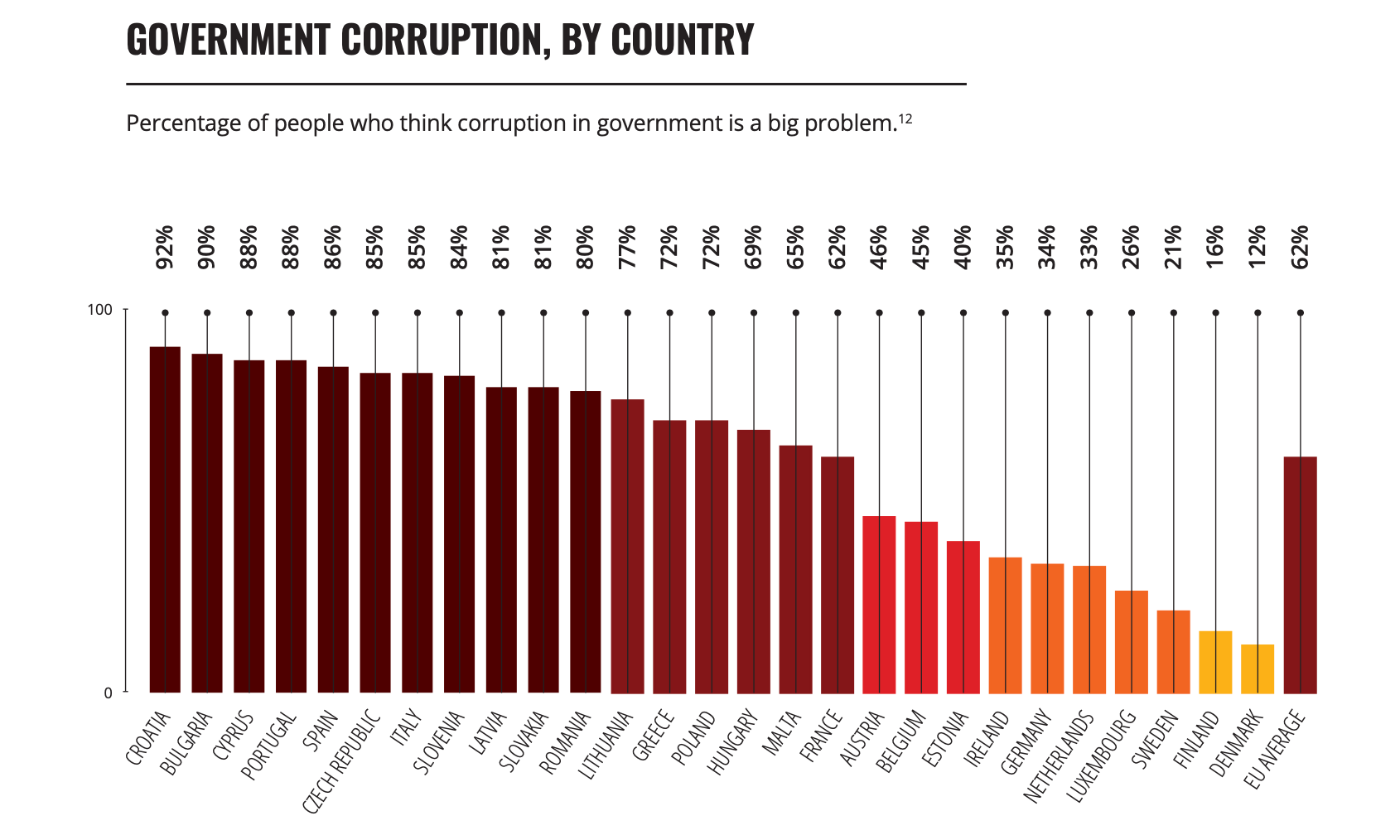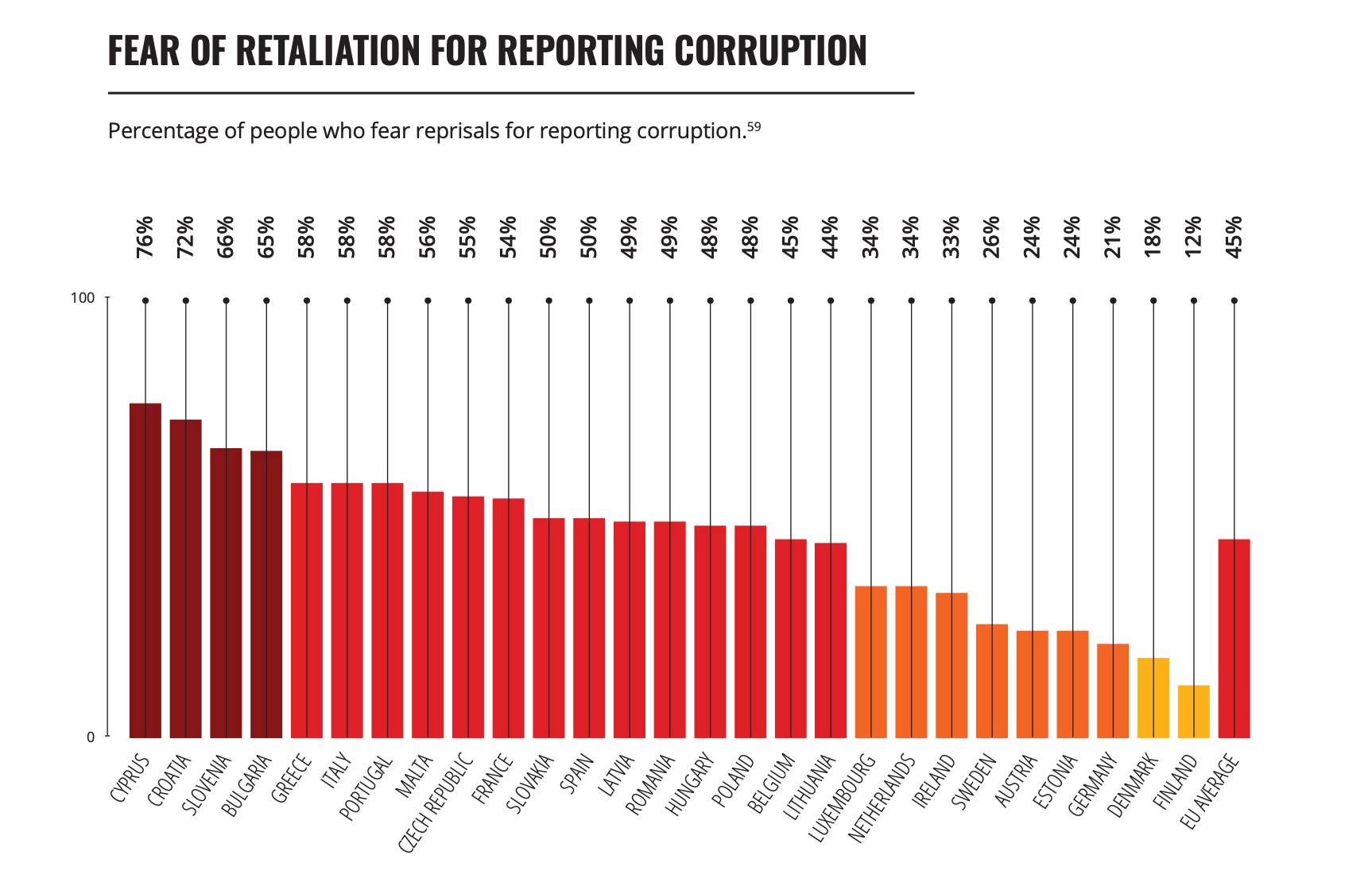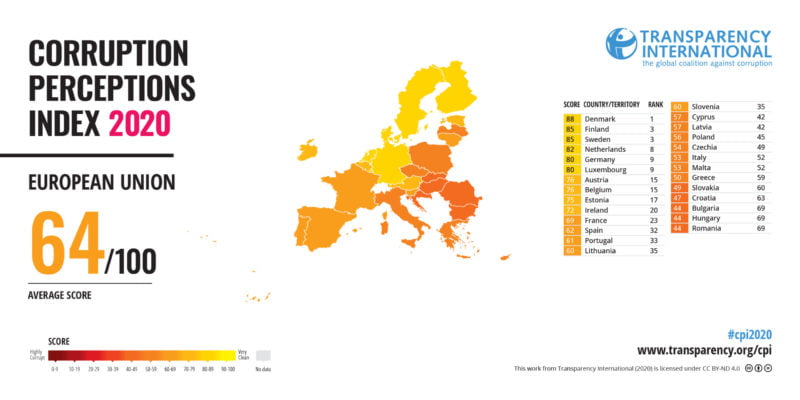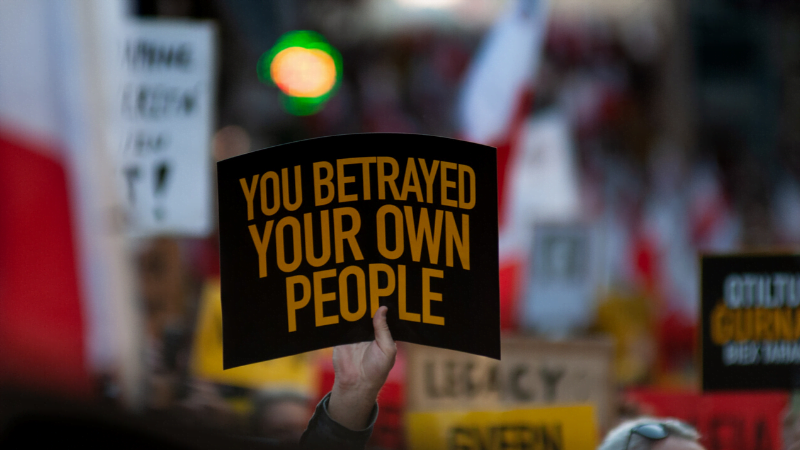Two-thirds of Maltese people think that government corruption is a problem in their country, in line with people in the rest of the EU, while more than half of people on the island fear retaliation if they report wrongdoing.
Across the EU, almost half say their government is doing a bad job at tackling corruption.
These are among the key findings of The Global Corruption Barometer- EU (GCB), one of the largest, most detailed surveys of people’s views on corruption and experiences of bribery in the 27 EU countries undertaken by Transparency International, details of which were published on 15 June.

Percentage of people who think corruption in government is a big problem. Source Transparency International 2021
The survey reveals how around a third of people think that corruption increased in their country in the past 12 months while 44 % think it remained the same. In half of the countries surveyed the most corrupt were deemed to be prime ministers and members of parliament, while in the other half it was business executives and bankers.
Other areas related to corruption such as the ties between business and politics, perceptions of impunity, and fear of retaliation for reporting on corruption were also explored. Only 21 % of people think that corrupt officials regularly face appropriate penalties and the people surveyed were divided about the safety of reporting wrongdoing, with 45 % fearing reprisals and 47 % not sharing this concern.
Health care, in particular, is considered a corruption hotspot as governments struggled to manage the COVID-19 pandemic. Although just 6 % of people paid a bribe for health care, 29 % of EU residents relied on personal connections to get medical care. Moreover, most people don’t think that their government has handled the pandemic in a transparent manner.
However, an encouraging element that emerges from the survey was that 64 % of EU residents think that ordinary people can make a difference in the fight against corruption.
The survey was conducted between October and December 2020, with the participation of 40,600 people in 27 EU countries, aged 18 and over.

Percentage of people who fear reprisals for reporting corruption. Source: Transparency International 2021
Of the 500 participants sampled for Malta, 65 % think that corruption in government is a big problem, 4 % paid a bribe for public services (in the previous 12 months) while 33 % used personal connections to make use of public services.
However, 48 % think the government takes people’s views into account when making decisions, but 49 % think the government is run by a few big interests.
Replying to other questions in the survey, 56 % of the Maltese participants think they can’t report corruption without fear of retaliation, while 39 % of the participants also feel that corruption levels have stayed the same over the last 12 months, though 28% think it has increased. Fifty-six per cent of those surveyed also think that the government is doing a good job of fighting corruption.
When asked whether ordinary people can make a difference in the fight against corruption, 77 % of the Maltese participants believe they can.
In January of this year, Malta had once again hit a new low in Transparency International’s annual Corruption Perceptions Index (CPI) after dropping another point since last year, to 53, and retaining its place as a country “to watch”.
The incidents of concern highlighted by the organisation included an EU report on the rule of law in Malta, former Prime Minister Joseph Muscat’s resignation, the arrest of former chief of staff Keith Schembri in relation to alleged kickbacks from the controversial passport scheme, and a European Central Bank report which found major failings in BOV “potentially allowing for money laundering and other criminal activities”.
Following the publication of the CPI, further analysis published by the international organisation described how the role of Malta’s cash-for-passports programme created “an ecosystem in which corruption can thrive is largely undealt with” and that the country needs to find viable economic alternatives instead of relying on passport and visa sales schemes.

The GCB report makes a number of recommendations for governments across the EU to support their people in the movement against corruption. These include increasing people’s participation during policymaking and ensuring the protection of those reporting on corruption by fully transposing the EU Whistleblower Directive by December 2021 and protecting civil society and journalists by adopting a dedicated EU directive to protect them from strategic lawsuits against public participation (SLAPPs) and vexatious legal action.
Further recommendations include improving the transparency of lobbying activities and of the legislative process, strengthening integrity standards within the private sector, and ensuring accountability for the abuses of power by increasing cooperation and information exchange between law enforcement agencies and by the effective monitoring and sanctioning of corruption and financial crimes across the bloc.
Commenting on the latest results of The Global Corruption Barometer- EU Delia Ferreira Rubio, Chair of Transparency International said: “The EU is often seen as a bastion of integrity, but these findings show that countries across the region remain vulnerable to the insidious effects of corruption”.
Michiel van Hulten, Director of Transparency International EU, added: “These results should be a wake-up call for both national governments and the EU institutions. Corruption is undermining public trust and policymakers need to listen to the concerns of the public”.
The full report can be read here.













Our biggest problem is that only 65% of the people think corruption in the government is a problem.
It’s amazing! 65% think there is corruption in government but, in truth, the % should be nearer 5%. There is no corruption in government and its institutions; there is a corrupt state with corrupt officials, with corrupt individuals who have the slightest grain of power, and corrupt petitioners who, in reality, admire people like Muscat, Mizzi, Schembri and the rest. Indeed, we will continue to vote for corrupt politicians and do not have the courage to change our voting patterns when those we elect prove to have been corrupt.